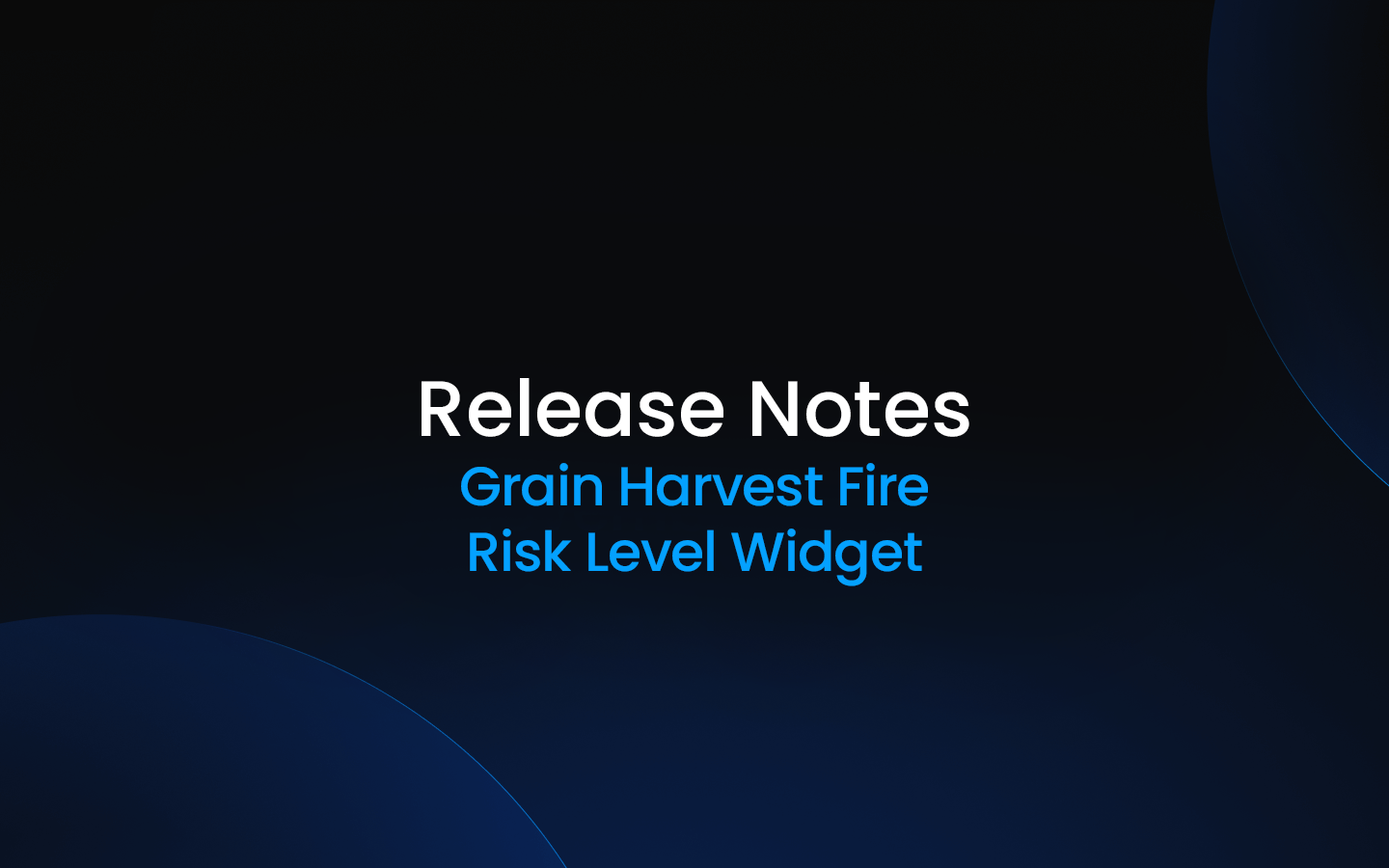As harvest season heats up, keeping an eye on fire risk is more important than ever. To make this easier, the INCYT app has a Fire Risk Widget built right into the Weather Application — giving you instant access to local harvest risk levels based on real-time weather conditions.

INCYT & LX Win Agricultural Spray Drift Challenge 2021
BRII Announces LX as Winners of the Revolutionising Agricultural Spray Grant for 2021. Maverick Spray Advisory System from LX chosen for development for BRII and CRDC.

Introduction to the BRII Challenge
In September last year we submitted a proposal for the Business Research and Innovation Grant (BRII), run in conjunction with the CRDC. The challenge the grant posed was to try and tackle the issue of Agricultural spray drift by using the latest technologies across AgTech, IoT, Wireless communications or any other technology.
We went through a rigorous research process that involved an audit of current solutions and ways of tackling the problem. We also researched all of the different variables that could and do affect the application of pesticides and other chemicals - from boom height and angle, to ground speed, wind direction, delta-T, nozzle type, temperature and humidity and the data sources that were available to farmers for these variables. We spoke to experts on the matter at length and conducted lots of focus groups and interviews with end users and influencers, from farmers and agronomists to members of the advisory boards and equipment providers.

From this market research and end user study, we learned some key insights that helped us develop our proposed solution. These insights included some of the following:
- The process of pesticide or agricultural chemical spraying is incredibly complex. The sheer number of factors that influence this process is huge and some of those factors can change in an instant.
- Although there are lots and lots of different educational resources and materials available on how to effectively plan for optimum spraying and how to avoid drift, these are often complex and can be contradictory. It could be overwhelming to know where to start.
- There are external data sources available like SATACrop but these sources are fairly disparate and usually only useful in pre-spray planning because of this.
- Whilst the process of planning, spraying and recording is as complex as taking off, flying and landing a plane, currently we don't equip farmers with anything like the sophisticated tools and instruments that pilots have access to.
- And most importantly, farmers don’t want to drift. From the discussions we had with primary producers, farm managers and agronomists, it was clear they know there is an issue with drift risk. But anything that sought to impact this issue would need to be accessible across a broad range of end users, not be cost prohibitive or overly complex and would also have to aim to improve efficacy. After all, it’s not just about avoiding drift for the social, economic and environmental impacts. Farmers are notoriously time poor, they work long days and any proposed solution that took more time than the current method or didn't offer any value in terms of real returns was unlikely to be adopted at scale. And we knew that for this solution to really have an impact it would need to be adopted at scale.
Our Proposed Solution to tackle Agricultural Spray Drift
Taking the above insights into account we started working on a solution that would aim to help farmers plan, spray and record the process more effectively. We wanted something that was productised at different price points, so we could overcome any barriers to entry for farmers unable to invest in higher value versions. Any solution would also need to be machinery agnostic for the same reason; it wouldn't work if end users needed to invest in expensive new machinery to access this.
We also wanted something that not only helped farmers avoid windows where the risk of drift was high but that also helped them get more chemical on target more of the time. And by using our product range of static sensing devices and trackers, we were keen to give them these updates in real time as well as through regular reporting that would create learning opportunities over a period.
Combining all of these factors into an architecture that involved LX designed hardware, software, 3rd party data sources and inputs… we created Maverick.

Introducing Maverick Spray Advisory System
Maverick is our Winning submission for the BRII Spray Drift Challenge and we’re so incredibly proud of the team for taking this idea from concept through to the final Proof of Concept stage. Hearing the news in late September 2021 that we had won the grant was just amazing!
Maverick is a tiered product solution that essentially aggregates all of the key inputs and data streams a farmer might need for agricultural spraying in one place. There is far more ‘behind the scenes’ complexity to how it works and the opportunities it provides that we cannot disclose at this stage, but it’s safe to say we think this will really encourage large scale uptake because we’ve designed it with the end user in mind.
Maverick by LX: Spray Drift Advisory System (BRII 2021 Solution) from LX Marketing on Vimeo.
And most importantly, we chose the name Maverick as it is cutting edge and exciting, but it also allows users to take calculated risks. With spraying there is always going to be some risk of drift, and sometimes we restrict farmers in windows because the risk is either too high or just too difficult to determine accurately. The Maverick system actually allows mid tier and advanced users to open up those spraying windows a bit more because you have access to data and reporting you wouldn’t have normally. And even at the entry level, it becomes a far more informed process so we’re helping everyone not only avoid drift but realise gains in efficiency.

Next steps for Maverick Spray Advisory
As we’ve mentioned, at the moment we can’t give away too much information about how the system works because it hasn’t launched yet. The next step for Maverick is building out the physical prototype and then rolling out our commercialisation plan to get Maverick in the market and available for farmers to try.






